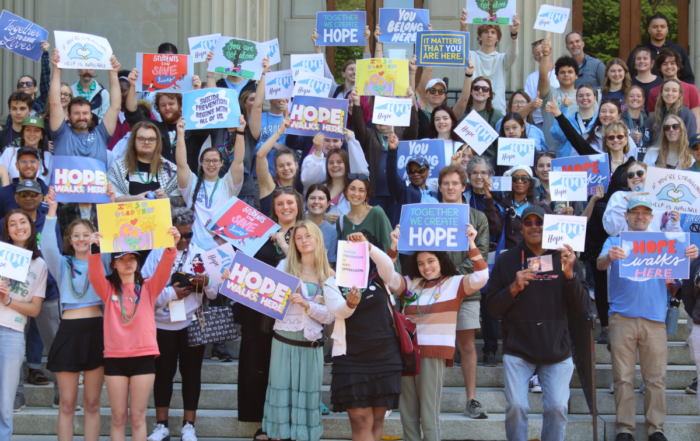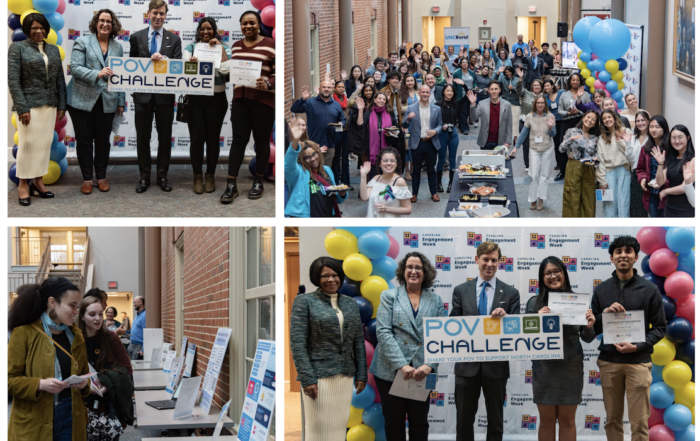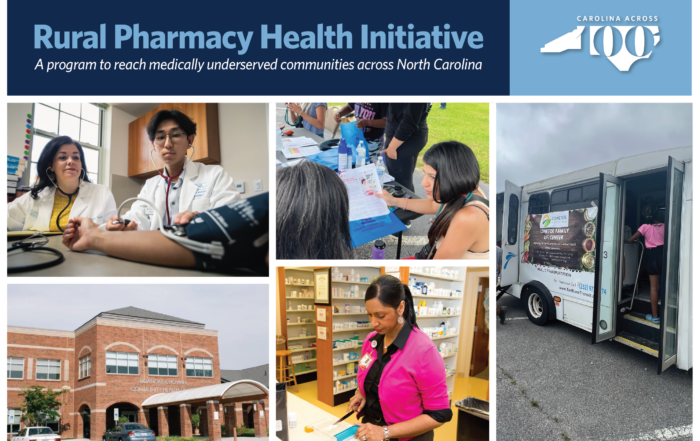Student Engagement
Looking Back and Looking Ahead: Impacts of Student Engagement
May 22, 2023
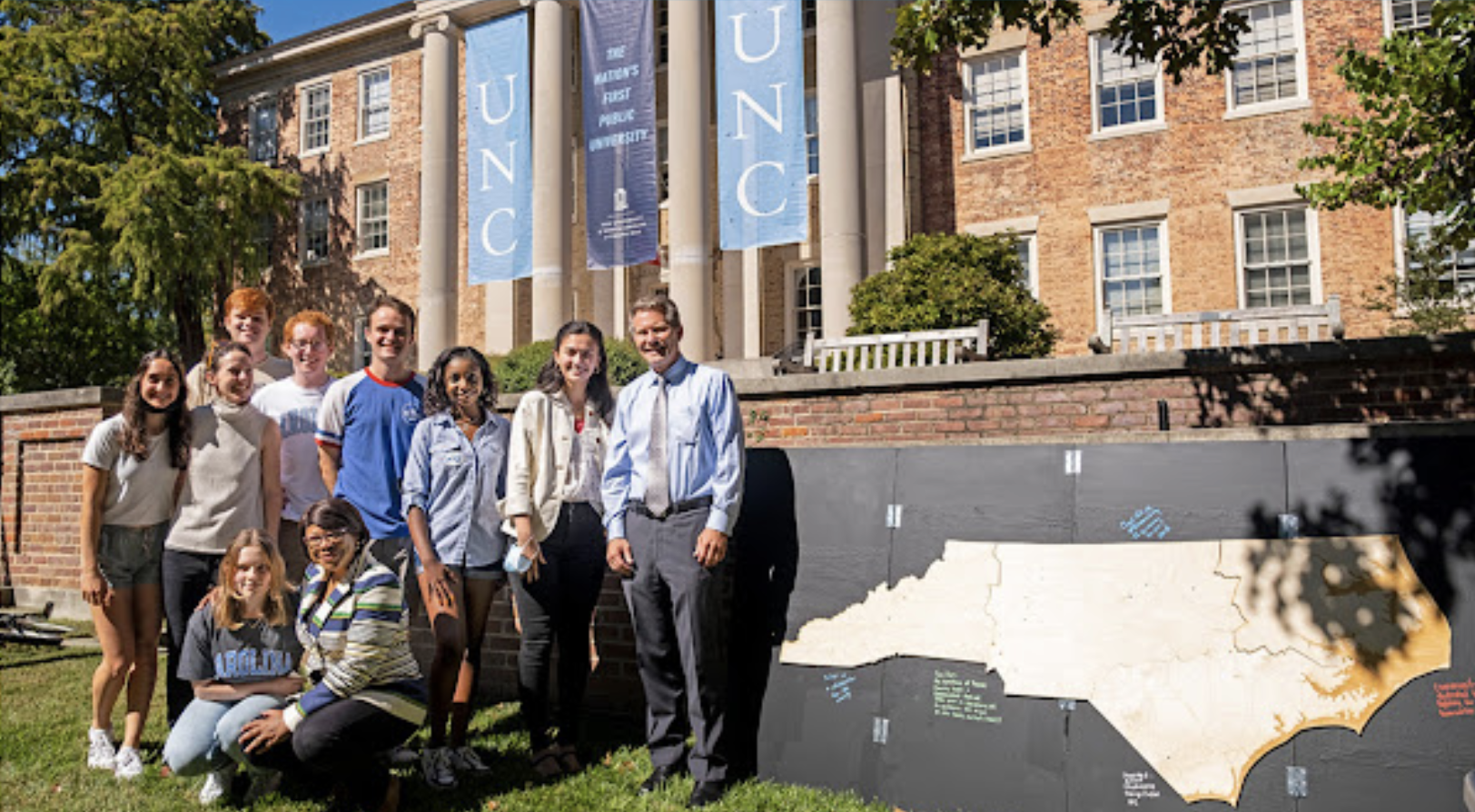
Photo Credit: Angelina Katsanis
On May 14th, the University of North Carolina at Chapel Hill graduated nearly 4,000 undergraduates, nearly 1,700 master’s degree students, and over 300 doctoral students. Among these graduates were students who have contributed to the Carolina Across 100 Initiative (CX100), a 5-year, pan-University effort to support communities in all 100 of North Carolina’s counties to address challenges exacerbated by COVID-19.
More than 150 students have played an integral role in this work since it launched in 2021. Their passion and commitment to the state have been inspiring and energizing, and the ways that they have engaged and supported the initiative have only continued to grow.
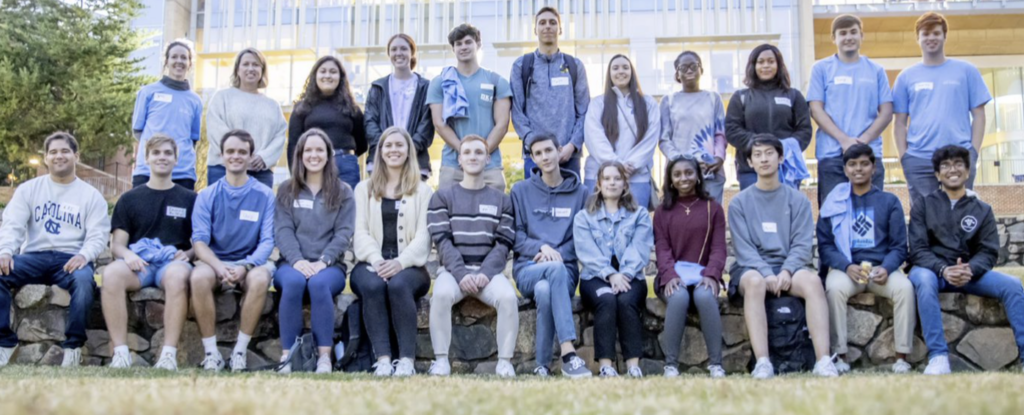
Some of the amazing CX100 student interviewers (Photo Credit: Ira Wilder)
Kicking it off with a small but mighty group (that quickly grew!)
It started with the student launch team, which included 3 undergrads and a graduate student. They conducted background research and completed interviews with over 20 stakeholders across the state to begin to understand our communities’ greatest pain points. These students summarized their findings into a report shared with the Carolina Engagement Council, a group of faculty and staff experts who help guide CX100.
This formative work created the foundation for a statewide survey that gathered responses from nearly 3,000 North Carolinians representing every county, and feedback from diverse sectors such as non-profits, businesses, and education. Following this survey, there were also more than 60 additional in-depth interviews. These interviews were conducted by an expanded group of nearly 70 UNC students who received training from UNC’s Odum Institute on qualitative data collection.
How else do students engage? Let us count the ways!
After early student engagements with our launch team and student interviewers, the contributions of students have expanded and deepened. Here is a sampling of how students have furthered CX100 over the past 18 months of CX100:
- 1
Through undergraduate and graduate capstones: Ten Public Policy students helped carry out critical research and analysis activities through literature reviews, county-level data analysis, and case studies. Five Master of Public Health students helped conduct focus groups, conduct qualitative analysis, summarize findings, and draft a community resource toolkit.
- 2
Through other academic coursework: Dr. Rudi Colloredo-Mansfeld and Dr. Elizabeth Frankenberg designed and launched a CX100 undergraduate class through the Department of Anthropology. The course focused on developing students’ community engagement skills and provided increased programmatic support to teams by pairing students with the 13 community collaborative teams that are part of CX100’s first program of work called Our State, Our Work (OSOW). Some of those students enjoyed working with their community team so much, the course was continued for another semester in Spring 2023! More than 30 students enrolled altogether.
- 3
Through blog writing: Nearly a dozen student blog authors shared their reflections on the project and the impacts of this engagement on North Carolina communities. Stay tuned for this blog series coming soon!
- 4
Through data visualization, design, and dissemination: Over 30 students participated in CX100’s POV Challenge (formerly the Hackathon). They flexed their data analysis, visualization, and design skills to share information about COVID-related challenges and the population of young adults known as Opportunity Youth, who are the focus of OSOW.
- 5
Through employment opportunities with the CX100 team: Supported us through undergraduate and graduate research assistantships, media management and communications roles, and data archiving for the overall initiative.
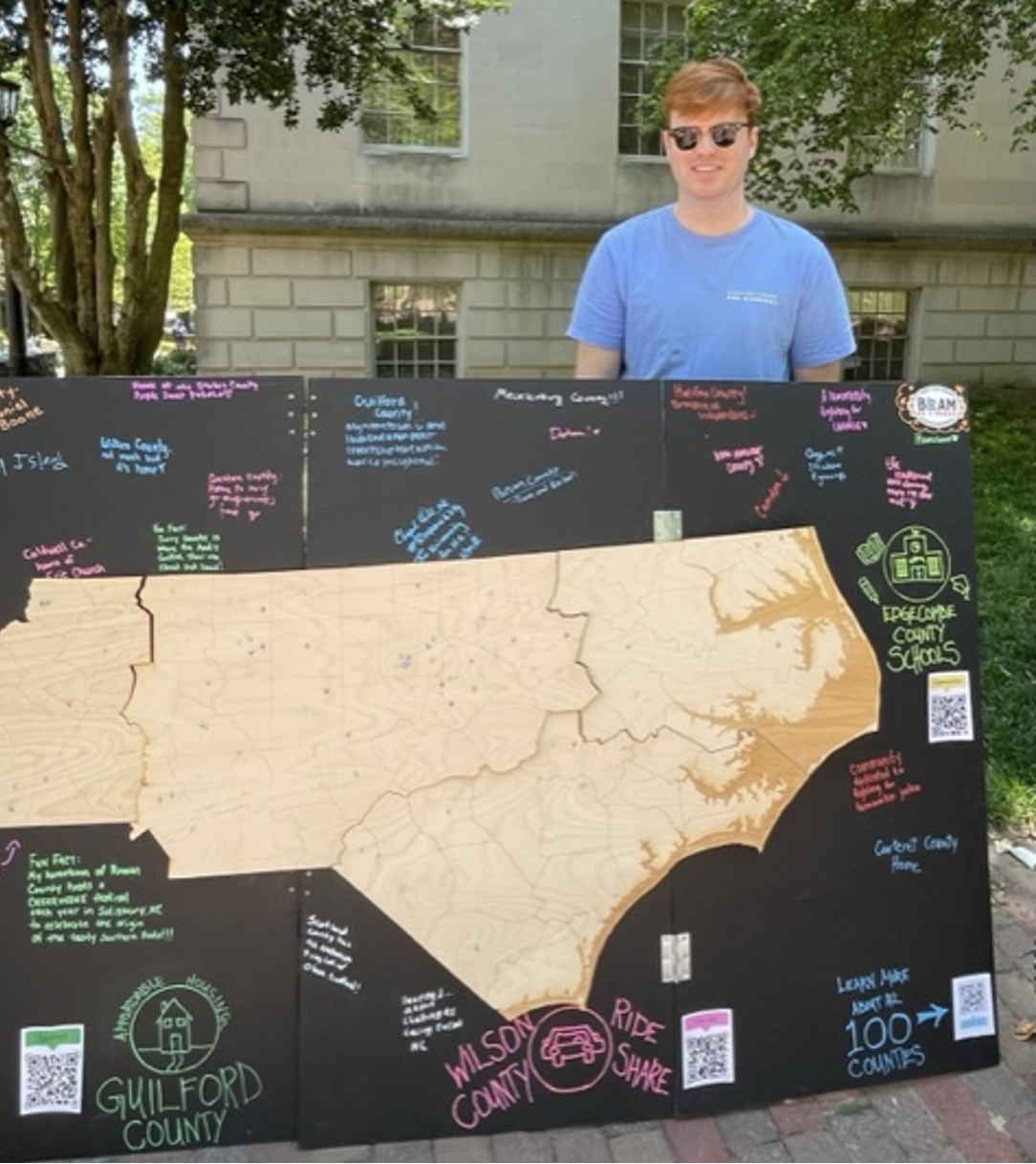
Photo credit: Wenxin Chen
Oh, and did we mention one of our MPA graduate research assistants, Charlie Chapman, used the UNC BeAM Maker Space to create an 8-foot-long wooden map of North Carolina that has been used at multiple student outreach events? That happened too. See the latest on the map pictured here.
Learning and impacts that extend beyond the classroom
Many of the CX100 student engagement opportunities include elements of experiential learning, often defined as ‘learning by doing,’ and then reflecting on the process. Research on this type of learning in higher education shows positive impacts for students including increased engagement in classroom learning, improved retention of information, and development of new skills that may better prepare students for employment, including technical and soft skills.
Our student interviewers, for example, were able to put their data collection training to use during the conversations they conducted with individuals from across the state, from stay-at-home parents to leaders of major financial institutions. All the student interviewers reported that they found the experience interesting, and 80 percent reported that they learned something new from this experience.
One shared:
“Chapel Hill and university towns more broadly can be little bubbles. So, I was surprised to learn about the issues these communities face and really excited to start thinking about the ways in which UNC can help.”
For students in the experiential learning class, their reflective writing assignments described the benefits of working directly with community organizations, such as the opportunities for personal and professional growth, development of communication skills, and increased awareness of the Opportunity Youth population that resulted from their experiences.
However, these benefits go both ways, and these positive experiences go beyond the students and extend out into the communities. Comments from community members who collaborated directly with students highlighted meaningful impacts. These include the expanded capacity that students contribute to tasks or deliverables the community organization wouldn’t have been able to otherwise complete, learning from the skills that students bring, such as social media and marketing, and the new perspectives, ideas, and approaches they gain from students.
The teams shared with us:
“[The students have been] providing a perspective and experience that we haven’t had and they assisted us in both tactical and strategic ways.”
“[The students] contributions added so much value to our vision and goals.”
“[The students] are leaving us confident that we can easily continue the work they have for our organization.”
Growing the Team
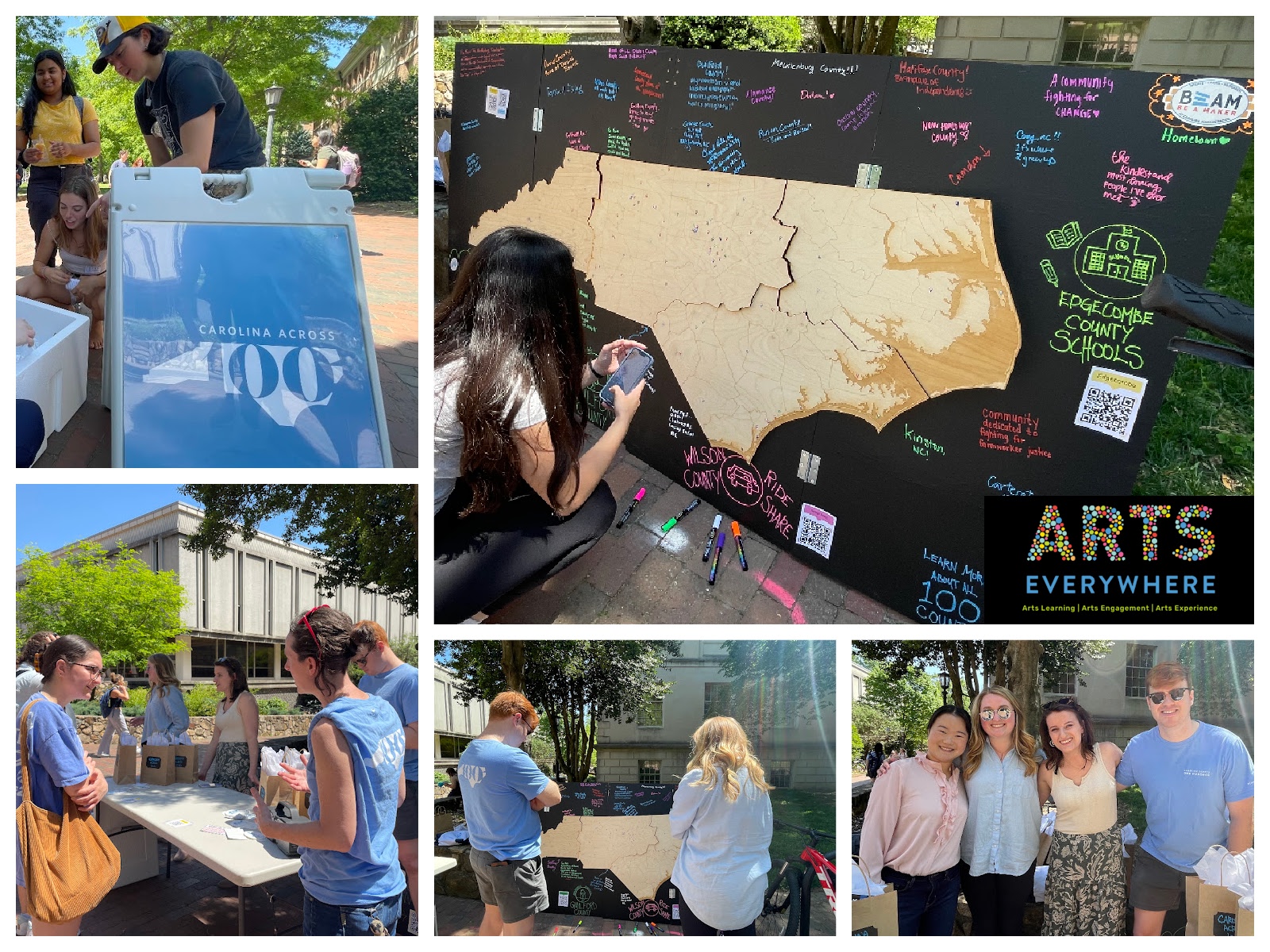
As many of our current students graduate and leave Chapel Hill for their next adventures, our team has begun recruiting new student leaders to support our work.
Last month, the CX100 team participated in Carolina Performing Art’s on-campus event, Arts Everywhere. In keeping with the 2023 theme “YOU are an Artist,” students were invited to interact with a large wooden NC map. Students placed pins on their hometowns and other places across the state to which they felt connected, and left doodles, notes, and fun facts about their home regions of North Carolina!
We loved connecting with students eager to jump into the effort when they return in the fall!
Know a student who might be interested in our work? Direct them to our Student Engagement Form. We’re always looking to connect!
Carolina Across 100 is a five-year initiative whose goal is to aid community-driven recovery and build sustainable efforts in all 100 counties by providing human resources, data insights, coaching, facilitation, coordination efforts, and program design.


